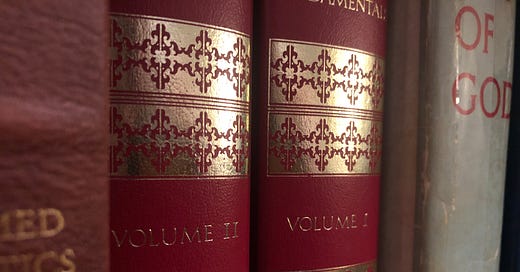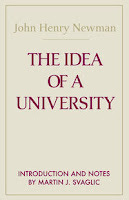So what's on the shelf these days? I've got a long backlog to make up since January, since my life was consumed in succession by my master's thesis, NSA graduation and a family visit, and Logos Online finals. All that being finally over, let's revel in the summer solitude by doing a little schlepping, shall we?
But first, a note and a request. I’m offering a “guided tour” (think of it as a book club led by someone who really knows the book you’re reading) of Cicero’s De Officies (“On Duties”) for high schoolers this summer. If you’ve got either 1. an eager learner or 2. a kid apparently lazing about with not enough to do, please drop me a comment or a DM, and I’ll shoot you the information. It looks to be a good time so far. And if you’re reading this and like what you get, it always helps to share and subscribe. Behold the buttons:
All right, enough with the business. Let’s get to the books.
Finished
The End of Protestantism by Peter Leithart. As a survey of some of the ways denominationalism goes wrong, and a record of some interesting church developments in the global south, it was fine. But I reject his overall theses—first that Jesus has not been granted his prayer for unity in John 17; second, that now is the time to shed denominationalism. As usual for Leithart, this is highly academic and studies-based. The world has changed rapidly since 2016, when this was written, and in my humble opinion it is woefully out of date due to the meteoric rise of nationalism and factionalism we've seen in the past decade. Perhaps this is the century of Protestantism after all?
The Great Betrayal by Ernle Bradford. A detailed and moving account of the scurrilous Fourth Crusade—which did not crusade at all but was diverted by the crafty Enrico Dandalo, the doge of Venice, to destroy and sack rival Constantinople, the last Christian barrier to the Mohommedan hordes in the east. The fact that a Crusading army got hoodwinked into doing a merchant's dirty work should make all the terminally-online Crusader anons think really deeply about their project. Simple zeal is not enough to do the Lord's work; sometimes it just means you do the Devil's work faster. Her treasury depleted and a vast amount of territory, scholarship, and craftsmanship lost during the sack and the Christian infighting that followed, Constantinople would fall to the Turks only a few hundred years later.
The Life of Antony by Athanasius. Translated H. Ellershaw (Nicene and Post-Nicene Fathers). Deeply moving and convicting. We Protestants lost much when, in our zeal to get rid of the rotting encrustation of wonder-working saints, we utterly discounted the life of sacrifice and miracles that so many of our ancient sources hold out clearly. The world is a wondrous place, and God works in it when we ask Him. May we ask more, and be worthy when we ask. I can see why Augustine (indeed, all Europe) was impressed.
Oliver Cromwell by Theodore Roosevelt. An interesting little book—more because of what it says about Roosevelt than Cromwell (I think Buchan’s version is both more detailed and more personal). This is a great read for students of American history. Teddy loves to pull parallels with the War for Independence and Washington; some of which, I think, are even true. Modern historians would denigrate this as too “Great Man Theory of History” and not complex enough. I think it is useful for precisely this moment, as we see how great men can actually shape history. Free Gutenberg Press ebook.
The Maker vs. the Takers by Jerry Bowyer. An economic explanation of Jesus’ life, parables, and crucifixion. While it’s important to approach this with the grain of salt that lurks in all explanations of scripture that just happen to line up with our own current viewpoints, I think he’s on to something. This makes several obscure/problematic passages in the Gospels work nicely. A recommended read, particularly as the Gospel references to "the Jews" continue to heat up on X.
The Idea of a Universityby John Henry Newman. Excellent and well-written, though it is a great pity his faith in Rome occasionally moves him to miss the point of his own work. A worthy candidate for required reading for a college faculty. What is a college? Why should we have one? What should we teach when we do have one? How do you avoid producing merely learned fools? Newman cogently answers all of these, while attacking the rise of the "scientific" research university in its very earliest (1852) days. An applicablesententia: “Nothing is more common in an age like this, when books abound, than to fancy that the gratification of a love of reading is real study.”
A boatload of ancient Roman rhetorical texts--from the usual suspects (Cicero and Seneca) to some more obscure corners (Calpurnius Flaccus or Libanius, anyone?) I think I learned a lot; I also doubt anyone else really cares. We shall nerd out about rhetoric another time.
Ploductivity by Douglas Wilson. A reread, but still great. If you struggle at all with time management and stewardship of your various responsibilities (and who doesn't?) get this and read it now.
In Progress
I'm working up a new Humanities III (that's medieval) course for Logos Online in the fall, so most of my reading right now are texts from that book list, though there are a few exceptions:
Shop Class as Soulcraft by Matthew B. Crawford. This one will probably warrant a full post when I'm done with it. Suffice it for now that I'm really enjoying it--enough to savor it and read it very slowly.
Le Morte D'Arthur by Thomas Malory. I've long been familiar with Howard Pyle's version, now I get a look at the original (1485). It's been fun spotting a few of my old vocabulary friends from Middle English, such as "thilke," though my favorite word thus far is "feutered"--as in "the knights feutered their spears, and dashed together, and bore each other down horse and man" (which happens quite a lot). By turns fun, allegorical, bawdy, chivalric, and barbaric; it's a fun summary of the late medieval period. Currently I'm in the tragedy of Tristram and Isolde.
Gesta Regum Anglorum (Chronicle of the Kings of England) by William of Malmesbury. In an age of Christian Nationalism debates, it's quite fun to see a historian evaluate a civil ruler by two simple criteria: did he protect his land from invaders, and did he support the church (usually monetarily). It's amazing how many times he's noted something along the lines of "This ruler killed a man and carried off his woman and lived with her in sin and was excommunicated for it (by the very bishop he'd appointed himself) and was drunk all the time, but he repented on his deathbed and left quite a bit of land to the local monastery, so all in all he was a blessed ruler. We know this because of the number of miracles that have occurred at his tomb." It's simply an utterly opposite way of looking at the world. "The past is a foreign country--they do things differently there."
Idylls of the King by Alfred, Lord Tennyson. It's fascinating to read this side-by-side with L'Morte and see how Tennyson adjusted/rewrote/cleaned up Malory for his Victorian audience. Don't hear that as bad; sometimes (the seduction of Merlin by Vivian, for instance) he vastly improved it. This is good enough that I'm annoyed I'm only encountering now; someone should have made me read it earlier.
In Defense of Christian Nations by Michael Belch. Just started this one. I had the privilege of meeting the author (a fellow LOS teacher) last week. So far, it looks like he's taking a similar tack to Abraham Kuyper in Common Grace, though from a slightly different angle: the nations are governed by the Noahic Covenant down to our own day, and are thus ordained by God for our ordering and instruction. More to come.
That will suffice for the moment. Thanks for reading!





